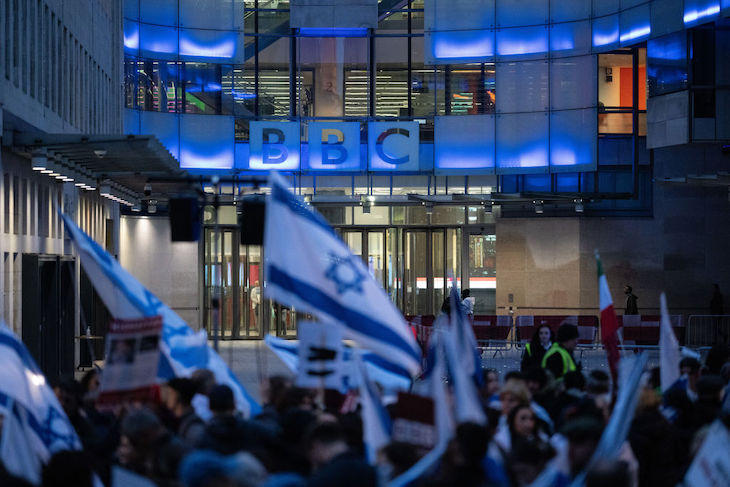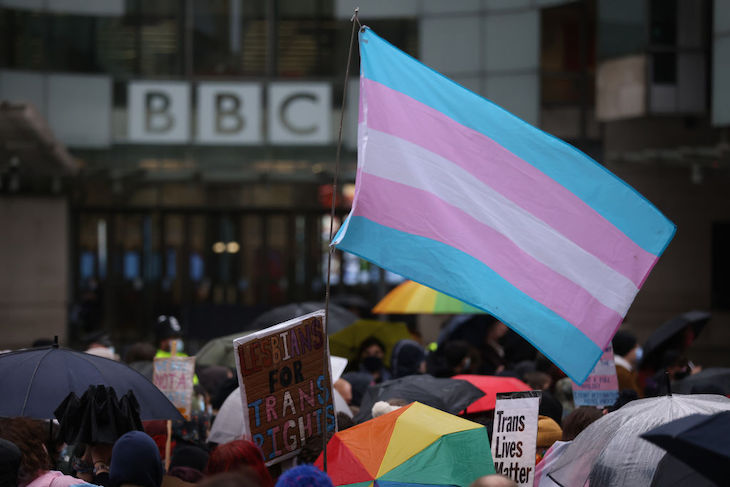The resignations at the top of the BBC mark a critical juncture for an institution long seen as a pillar of British public life. Yet their departures, while welcome, are insufficient. The BBC’s failure is not confined to the mistakes of individual executives. It is institutional, entrenched, and long overdue for a reckoning.
The BBC has repeatedly blurred moral lines on Israel and antisemitism
Unlike privately funded media outlets, be it GB News, Talk, The Spectator, the Daily Telegraph, or the Daily Mail, the BBC is funded by coercion. Britons are compelled by law to finance its operations if they own a television, regardless of whether they watch or endorse its content. This fundamental difference imposes a burden of impartiality on the BBC which it has consistently failed to uphold. But it also requires the corporation to fulfil a higher purpose, filling a void that commercial outlets simply can’t afford to, or won’t be able to with the commercial pressures they face. It is failing at both of these requirements.
The organisation’s bias is not subtle. It is not occasional. It is systematic. Certain worldviews are endlessly reinforced and opposing views treated as aberrations. This intellectual monoculture has had profound consequences. Nowhere has this been more evident than in the BBC’s reporting on the Middle East. Over the past two years, its coverage has descended into a mire of distortion, omission, and outright calumny, particularly in its treatment of Israel. Whether born of groupthink or malice, the result is the same: the British public has been misled, repeatedly and egregiously. But the BBC has actually been guilty of this for decades.
One need only consider the BBC Arabic service. Despite ample warnings, the corporation has employed individuals with clear records of anti-Semitism and radical bias. These are not idle accusations. Translations and investigations have exposed journalists and guests who have praised the savage assault on Israel on October 7, even invoking Hitler approvingly in reference to Jews. These individuals have been broadcast multiple times.
The departure of two high-profile executives won’t change any of the machine beneath them that constantly produces this material. Why does the world need another Arabic propaganda channel?
The infamous documentary on Gaza, narrated by the son of a Hamas official and replete with non-sequential editing, was another nadir. A child, Zakaria, said to be helping as a sort of paramedic, despite being perhaps ten years old, featured extensively. The segment used scenes and manipulated footage which was non-sequential, giving a false impression that the actions shown took place on one day in response to a single event. Their own internal report admitted this, but pretended it was insignificant. This is exactly what the Daily Telegraph revealed they did with the speech of Donald Trump, which they edited inaccurately to suit a specific narrative. The journalistic malpractice was blatant, yet unacknowledged. I later revealed social media photos of Zakaria brandishing a gun and wearing Hamas clothing, but none of that made their cut.
The BBC, had it any genuine public service ethos remaining, could have produced a powerful and courageous documentary about the real abuse of children in Gaza: how they are indoctrinated, weaponised, and celebrated not for their innocence but for their proximity to jihad. It could have shown children like Zakaria as manipulated props in a grotesque theatre of war: play-acting as medics one moment, brandishing weapons the next, paraded at rallies, and groomed by terrorist adults into chants of murder. This is all part of a systemic programme of psychological and ideological grooming, broadcast openly on Palestinian social media and known to any decent journalist willing to look. And crucially, this is precisely the kind of programme the BBC, unlike commercial outlets, could have made without fear of losing advertisers or being boycotted by angry pressure groups, had it chosen truth over narrative. That it chose instead to whitewash this reality, framing these children solely as victims of Israeli action while ignoring their exploitation by Hamas, is not simply a journalistic failure, it is complicity in a profound moral inversion which we are forced to pay for.
When Jeremy Bowen, one of the BBC’s most senior correspondents, claimed that an Israeli strike had ‘flattened’ a hospital which other reports claimed resulted in 500 deaths, he was not engaging in intelligent reporting. He was making a claim unsupported by evidence. Those familiar with the region and with Israel’s military record could see immediately that the scene bore the hallmarks of a Palestinian rocket misfire. That is, in fact, what it was. Bowen has since refused to express regret. Whether intentional or not, the effect was the same, and the falsehood was aired as truth.
One mistake may be an error, two misfortune, but when the same pattern recurs over decades, always leaning in one direction, it looks like a habit or worse, a culture. The BBC has repeatedly blurred moral lines on Israel and antisemitism: it refused to call Hamas ‘terrorist’ even after October 7; mistranslated ‘Jews’ as ‘Israelis’ and scrubbed the word ‘jihad’ from subtitles to hide Palestinian antisemitism; and misrepresented Jewish children attacked on Oxford Street by suggesting they had used anti-Muslim slurs – an allegation later disproven.
From Barbara Plett in 2004 admitting she cried as Yasser Arafat was airlifted for medical treatment, to Tim Willcox in 2015 telling a Jewish interviewee in Paris that ‘Palestinians suffer hugely at Jewish hands,’ to Anjana Gadgil in 2023 telling former Israeli prime minister Naftali Bennet that Israeli forces were ‘happy to kill children,’ the pattern is unmistakable.
Antisemitic posts by Arabic-service reporters, the omission of Jerusalem as Israel’s capital on the 2012 Olympics site, and the continued suppression of the infamous Balen Report, on the corporation’s coverage of the Israeli-Palestinian conflict, only deepen the case. These are the markers of an institution where ideological alignment has long displaced editorial integrity.
Some defenders of the BBC invoke its founding mission: to produce programming free from market pressures, to champion creative risks, and to inform the public without fear or favour. But one must ask: when was the last time the BBC actually did that? When did it last exemplify the virtues it was designed to uphold? Instead, its programming and news output are indistinguishable from that of commercial rivals, or at times are far worse. It no longer needs to exist.
It is no longer enough to remove a director-general or a news executive. The rot runs deeper. A comprehensive overhaul is required – one that does not simply hire new personnel in the same mould, but confronts the ideological homogeneity that has taken root. The next appointments must not be continuity candidates who perpetuate the same biases under a different name.
If the BBC wishes to survive as a trusted institution, it must abandon the pretence of impartiality while functioning as an ideological actor. It must stop pumping out positions as if they are consensus, and cease attempting to re-educate the nation under the guise of news and culture. Otherwise, it must enter the commercial sphere like any other outlet, subject to the discipline of the market and the judgement of the public.








Comments